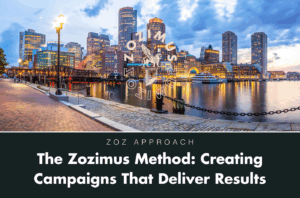Search is changing. For years, Search Engine Optimization (SEO) has been the cornerstone of digital marketing strategies, helping brands rank high in search results and drive organic traffic. But as artificial intelligence (AI) continues to advance, a new era of search is emerging—one that’s faster, smarter, and more intuitive. Enter Generative Engine Optimization (GEO), the next evolution of search technology.
With the rise of AI-powered search engines like SearchGPT, the way users find information online is shifting dramatically. These AI-driven engines don’t just deliver one-off results based on keywords; they provide contextual, conversational responses that evolve with each user’s query. Traditional SEO strategies, while still important, no longer tell the full story when it comes to search visibility.
In this post, we’ll explore the key differences between SEO and GEO and what brands need to know to stay ahead in this changing landscape. If you’re ready to embrace the future of search and position your brand for success in the age of AI, keep reading to discover how Generative Engine Optimization is redefining the rules of digital marketing.
What is Generative Engine Optimization (GEO)?
Generative Engine Optimization (GEO) is the future-facing approach to search, designed to enhance visibility on AI-powered platforms like ChatGPT, Gemini, Perplexity, Copilot, and Google AI Overviews. Unlike traditional SEO, which focuses primarily on optimizing for search engines like Google, GEO aims to ensure that content is highly accessible and usable by AI-driven engines that prioritize conversational and contextual search. These platforms are becoming increasingly popular, requiring brands to shift their focus toward new strategies for maintaining visibility.
A core aspect of GEO is content optimization. In this AI-driven landscape, content needs to be crafted not only for human readers but also for AI algorithms that rely on natural language processing (NLP). This involves structuring content in ways that AI systems can easily parse, synthesize, and use to provide accurate responses. Well-optimized GEO content flows naturally while also being structured to ensure that AI can extract meaning and context effectively, creating a seamless experience for both users and machines.
Another key element of GEO is its ability to anticipate user intent more effectively than traditional SEO. AI search engines use advanced algorithms to interpret user queries with greater precision, understanding the nuance behind a user’s search journey. This means GEO places a strong emphasis on delivering highly contextualized content that not only addresses the initial query but also anticipates follow-up questions, providing a more fluid, conversational experience.
Finally, GEO focuses on information synthesis. Unlike traditional SEO, where each webpage is optimized to rank individually, GEO requires content to be part of a broader context. AI-powered engines synthesize information from multiple sources, integrating content into more comprehensive answers for users. This means that brands need to focus on creating high-quality, authoritative content that can be woven into the rich tapestry of information AI engines pull from to generate responses. GEO optimizes not just for page rankings, but for how effectively content contributes to the overall conversation.
GEO vs. SEO: Understanding the Key Differences
While Generative Engine Optimization (GEO) and Search Engine Optimization (SEO) share some common ground, particularly in their focus on maximizing visibility in search results, they cater to fundamentally different types of search engines and user experiences. Let’s explore the major distinctions between the two approaches:
Search Engine Focus
Traditional SEO is centered around optimizing for search engines like Google, Bing, or Yahoo, where the primary goal is to achieve high rankings on a search results page. This involves a deep understanding of how search engines index and rank content based on factors like keywords, backlinks, and on-page SEO elements.
In contrast, GEO targets AI-driven search engines like ChatGPT, Gemini, Perplexity, and Google AI Overviews. These platforms are conversational in nature and use advanced natural language processing (NLP) to understand queries and generate contextualized answers. Instead of merely trying to rank high on a static search results page, GEO ensures that content is accessible and valuable to AI systems that are delivering more nuanced, human-like responses. The focus shifts from optimizing for click-throughs to ensuring that AI engines can interpret, synthesize, and integrate your content into its responses.
Response Generation
One of the defining differences between GEO and SEO is how they approach search results. SEO optimizes content to appear on search engine results pages (SERPs) as a list of clickable links. When a user searches for something, they are presented with a variety of link options, and SEO strategies focus on making sure your content is ranked among the top results to increase click-through rates.
GEO, on the other hand, optimizes for AI systems that generate instant, comprehensive responses. Instead of directing users to a list of links, AI-powered platforms like SearchGPT pull from a wide range of content to create a single, synthesized response. This means GEO needs to ensure that the content produced by brands is highly relevant and structured to seamlessly fit into an AI-generated answer. It’s about crafting content that AI can weave into the broader context of a conversation or query, which is far more dynamic than traditional SEO’s focus on ranking links.
Algorithm Adaptation
In SEO, much of the strategy revolves around adapting to the algorithm updates of traditional search engines. Google, for instance, constantly rolls out updates to its search algorithms, requiring SEO experts to stay on top of changes in ranking factors, such as mobile optimization, page speed, and content freshness. SEO’s focus is on understanding and responding to these algorithmic changes to maintain or improve search rankings.
GEO requires an ongoing adaptation to the evolving capabilities of AI systems. These AI-driven engines are constantly learning and refining how they interpret, generate, and deliver information. This means GEO needs to be more flexible and future-oriented, as AI platforms don’t just rely on keyword matching or page structure—they understand context, intent, and even the relationships between concepts and topics. As AI evolves, GEO strategies must adapt to these advanced capabilities, ensuring content remains relevant, accurate, and aligned with how AI interprets user intent.
In short, while SEO is about ranking on traditional search engines, GEO is about being part of the AI-generated conversation. As AI search engines continue to rise in popularity, the ability to seamlessly integrate your content into these dynamic responses will become increasingly crucial for brands looking to maintain visibility in the digital landscape.
Effective GEO Strategies for Success
With the rise of AI-driven search engines, optimizing your content for Generative Engine Optimization (GEO) requires a thoughtful, strategic approach. Unlike traditional SEO, GEO demands that content not only be relevant to users but also easily understood and synthesized by AI systems. Here are some key strategies to ensure your content is ready for AI-powered search platforms:
Content Contextualization
AI engines excel at understanding context and user intent. To optimize for GEO, your content needs to go beyond basic keyword targeting and focus on contextual relevance. This means crafting content that provides thorough answers to user queries, anticipating follow-up questions, and fitting into the broader topic naturally. AI-driven platforms prioritize content that offers deep, meaningful insights rather than surface-level keyword stuffing. Each piece of content should aim to solve specific problems or provide clear, concise information that an AI can easily extract and incorporate into its responses.
Structured Data
AI systems, particularly those using natural language processing (NLP), thrive on well-organized content. Implementing structured data—such as schema markup—helps AI engines understand the relationships between different pieces of information on your website. Structured formats enable AI to parse and analyze your content more efficiently, ensuring it can extract the most relevant information for users. For example, FAQ schema, product listings, and event data provide easy-to-understand formats for AI, improving your chances of appearing in conversational results.
Authority Building
Just like traditional SEO, building authority is crucial for GEO. AI systems favor authoritative, credible sources when generating responses, so consistently publishing high-quality, helpful content remains essential. In addition to regular content publication, focusing on earning backlinks from reputable websites can boost your domain’s authority. AI-driven platforms are more likely to pull content from authoritative sites when constructing answers, so establishing your site as a trusted source will improve your visibility in AI-generated responses.
Local Optimization
Local queries are becoming increasingly important as AI systems evolve. Ensuring that your business is optimized for local searches is critical, particularly on AI-powered platforms. Online reviews from sources like Google Business Profiles and Yelp play a significant role in AI’s ability to recommend local businesses. Encouraging satisfied customers to leave positive reviews and keeping your local listings accurate and up-to-date can significantly boost your visibility for geographically targeted searches. GEO strategies should include focusing on local SEO tactics to maximize results in localized queries.
Citation and Statistics
AI systems favor content that includes concrete data and credible references. Incorporating citations, statistics, and authoritative sources in your content can improve its chances of being used by AI engines in generated responses. Cited content not only enhances the trustworthiness of your material but also aligns with how AI evaluates the reliability of information. By backing up your content with verifiable data, you make it more likely that your content will be included in responses and improve the overall performance of your GEO strategy.
By implementing these effective GEO strategies, you can position your brand for success in the evolving world of AI-driven search. As AI search engines continue to develop, focusing on these tactics will ensure that your content remains relevant, authoritative, and ready to be integrated into AI-generated conversations.
As the search landscape shifts toward AI-driven platforms, staying relevant requires more than just traditional SEO tactics. At Zozimus, we’re at the cutting edge of Generative Engine Optimization (GEO) and constantly evolving our strategies to meet the demands of emerging search technologies.
Our team understands how AI-powered engines like SearchGPT are changing the game, and we’re here to help your brand adapt and thrive. Whether it’s crafting context-rich content, building authority, or optimizing for local search, we have the expertise to boost your visibility and keep your brand ahead of the curve. Contact Zozimus today to explore how we can help you dominate this new era of search and ensure your brand remains at the forefront of digital discovery.

David Wilson
EVP, Digital Marketing & Performance
David has more than 20 years working in digital marketing, covering in-house for a variety of companies, agencies and running his own digital marketing company. He has worked on Fortune 500 clients in the Pharmaceutical, CPG, Financial Services, and Healthcare verticals.
David brings a passion for proven results to the Zozimus digital marketing team. When asked what he likes about his job, David says that “every day his team has metrics that they are trying to hit for clients. At midnight the scoreboard gets set back to zero and we either hit our goals or we didn’t.”
BOSTON, MARS



